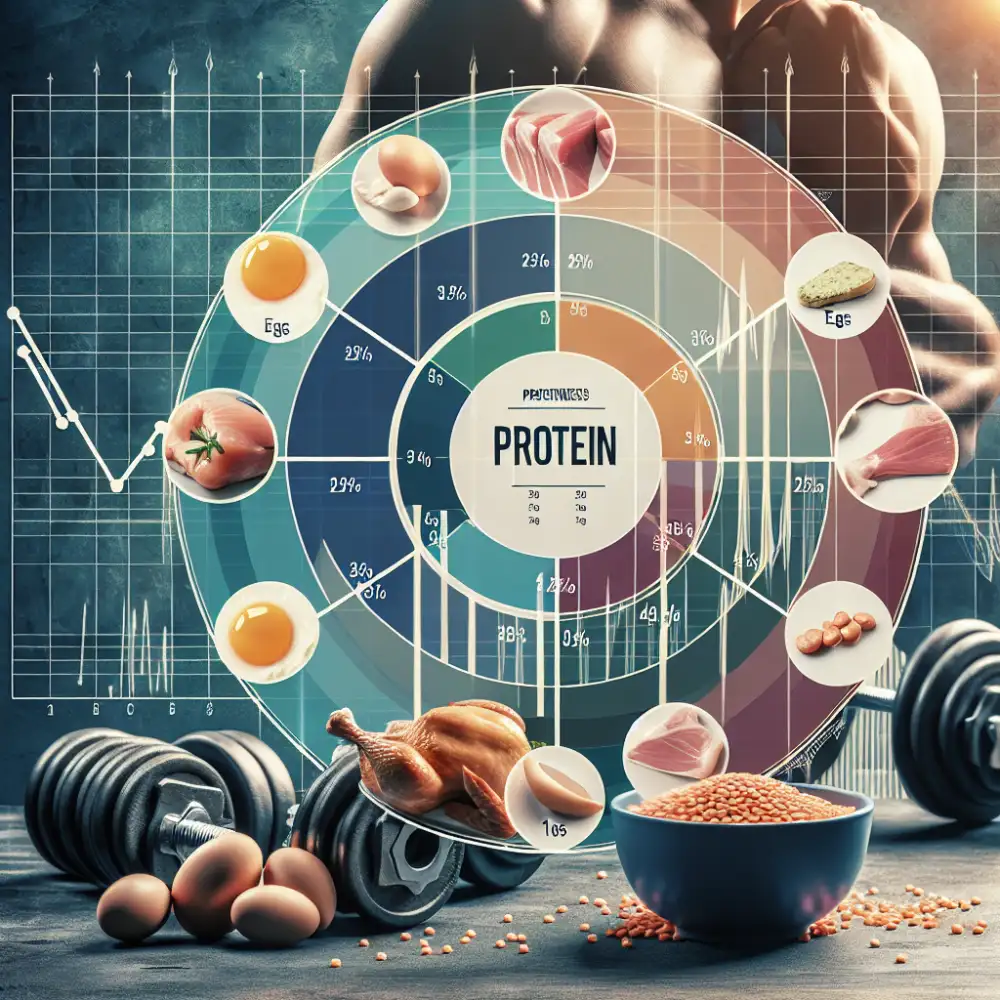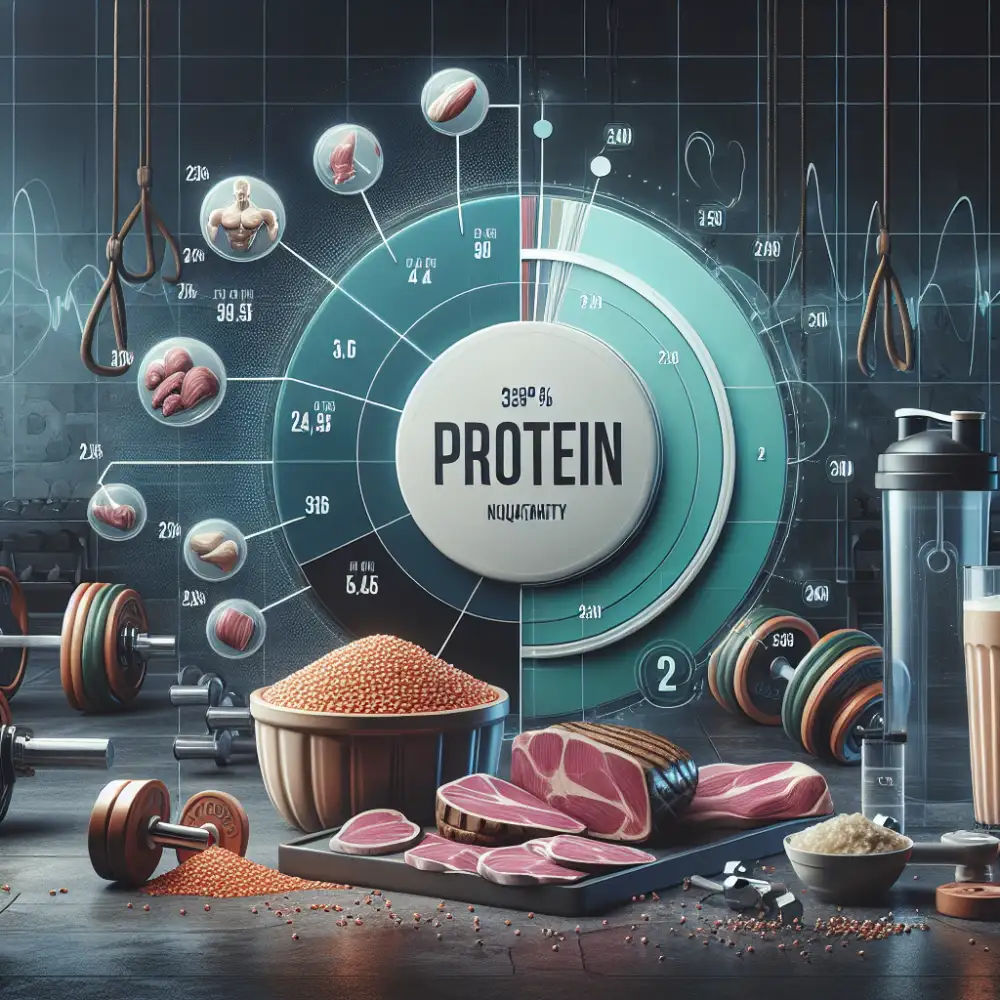Protein Power: Unveiling the Optimal Amount of Protein for Muscle Building

- Importance of protein for muscle growth
- Recommended daily protein intake for muscle building
- Factors influencing protein requirements for muscle building
- Protein sources for muscle building
- Timing of protein consumption for muscle growth
- Potential risks of excessive protein intake for muscle building
Protein is an essential macronutrient that plays a crucial role in muscle building. When it comes to achieving optimal muscle growth, protein becomes the cornerstone of any fitness regimen. Proteins are made up of amino acids, which are the building blocks for repairing and rebuilding muscle tissue. Without an adequate supply of protein, our muscles cannot recover and grow after intense workouts.
Muscle building requires breaking down existing muscle fibers through resistance training exercises. After this breakdown, the body repairs and rebuilds the muscles stronger than before. Protein provides the necessary amino acids to support this repair process, ensuring that muscles can adapt and grow.
In addition to repairing muscle tissue, protein also helps in the synthesis of new proteins within the body. This process, known as protein synthesis, is vital for increasing muscle mass. Protein intake stimulates protein synthesis, leading to increased muscle hypertrophy over time.
Understanding the importance of protein in muscle building is crucial for individuals looking to maximize their gains. In the following sections, we will explore recommended daily protein intake for muscle building, factors influencing protein requirements, sources of protein for muscle growth, timing of consumption, potential risks of excessive intake, and how to strike a balance for optimal results.
Importance of protein for muscle growth
Protein plays a crucial role in muscle growth and development. When we engage in activities that challenge our muscles, such as weightlifting or resistance training, microscopic damage occurs within the muscle fibers. In order to repair and rebuild these damaged fibers, our bodies require an adequate supply of protein.
Protein is made up of amino acids, which are the building blocks of muscle tissue. Consuming enough protein ensures that our bodies have the necessary amino acids to repair and build new muscle fibers. Additionally, protein helps to stimulate the production of anabolic hormones, such as insulin-like growth factor 1 (IGF-1), which further promotes muscle growth.
Research has consistently shown that individuals who consume higher amounts of protein have greater gains in muscle mass compared to those with lower protein intake. This is because protein provides the essential nutrients needed for muscle repair and growth.
Furthermore, protein also aids in the recovery process after intense exercise. It helps to reduce muscle soreness and inflammation by providing the necessary amino acids for tissue repair. This allows individuals to recover faster and train more frequently, leading to increased muscle growth over time.
In summary, protein is vital for muscle growth as it provides the necessary amino acids for repairing and building new muscle fibers. Adequate protein intake not only supports muscle development but also aids in recovery from intense workouts. To maximize your muscle-building potential, it is important to ensure you are consuming enough high-quality protein in your diet.

| Activity Level | Recommended Daily Protein Intake (grams per kg of body weight) |
|---|---|
| Sedentary (little to no exercise) | 0.8 - 1.0 |
| Lightly Active (light exercise/sports 1-3 days/week) | 1.2 - 1.4 |
| Moderately Active (moderate exercise/sports 3-5 days/week) | 1.4 - 1.6 |
| Very Active (hard exercise/sports 6-7 days/week) | 1.6 - 1.8 |
| Extremely Active (very hard exercise/sports & physical job or training twice a day) | 1.8 - 2.0 |
Recommended daily protein intake for muscle building
Recommended daily protein intake for muscle building varies depending on factors such as age, sex, weight, and activity level. The general guideline is to consume 0.8 grams of protein per kilogram of body weight for sedentary individuals. However, for those actively engaged in muscle building exercises, the recommended intake increases to 1.2-2 grams of protein per kilogram of body weight. For example, a person weighing 70 kilograms would need approximately 84-140 grams of protein daily. It is important to distribute protein intake evenly throughout the day to maximize muscle synthesis and repair. Consulting with a healthcare professional or registered dietitian can help determine the appropriate protein intake based on individual goals and needs.
Factors influencing protein requirements for muscle building
Factors influencing protein requirements for muscle building include an individual's body weight, activity level, and overall goals. Generally, individuals engaged in intense resistance training or endurance activities require more protein to support muscle repair and growth. Age also plays a role, as older adults may have higher protein needs due to decreased muscle synthesis. Additionally, factors such as gender, genetics, and metabolic rate can affect protein requirements. It is important to consider these factors when determining the optimal amount of protein for muscle building.
Protein sources for muscle building
Protein is an essential nutrient for muscle building, and incorporating the right protein sources into your diet can greatly enhance your muscle growth. Some of the best protein sources for muscle building include lean meats such as chicken, turkey, and beef. These meats are not only high in protein but also provide essential amino acids that aid in muscle repair and growth.

Fish, such as salmon and tuna, is another excellent source of protein for muscle building. Fish is rich in omega-3 fatty acids, which have anti-inflammatory properties and promote muscle recovery after intense workouts.
Eggs are a versatile and affordable protein source that should not be overlooked. They contain all nine essential amino acids necessary for muscle growth. Additionally, eggs are packed with vitamins and minerals that support overall health.
For those following a vegetarian or vegan diet, plant-based protein sources like tofu, tempeh, lentils, chickpeas, and quinoa can provide ample amounts of protein for muscle building. These plant-based proteins are not only high in quality but also rich in fiber and other beneficial nutrients.
Dairy products such as milk, yogurt, and cottage cheese are also excellent choices for muscle-building protein. They contain both whey and casein proteins that are easily digested and absorbed by the body.
Incorporating a variety of these protein sources into your meals can ensure you receive all the essential amino acids needed for optimal muscle growth. Remember to choose lean cuts of meat or opt for low-fat dairy products to minimize saturated fat intake while maximizing protein consumption.
Timing of protein consumption for muscle growth
Timing of protein consumption plays a crucial role in maximizing muscle growth. Research suggests that consuming protein within 30 minutes to one hour after a workout can enhance muscle protein synthesis, the process responsible for muscle repair and growth. This post-workout window is considered an optimal time to provide the body with essential amino acids needed for muscle recovery. Additionally, spreading protein intake evenly throughout the day, rather than consuming large amounts in one sitting, can promote continuous muscle protein synthesis. It is recommended to include a source of high-quality protein in each meal or snack to support muscle building efforts.
Potential risks of excessive protein intake for muscle building
While protein is essential for muscle growth, it is important to be mindful of the potential risks associated with excessive protein intake. Consuming too much protein can strain the kidneys and liver, as they are responsible for processing and eliminating excess nitrogen from protein breakdown. This increased workload on these organs can lead to long-term damage and impaired function.
Additionally, a high-protein diet may result in dehydration due to increased water loss during the metabolism of protein. This can put stress on the kidneys and potentially lead to kidney stones or other urinary complications.

Furthermore, excessive protein consumption often means a disproportionate intake of certain nutrients while neglecting others. This can lead to an imbalance in nutrient levels, potentially causing deficiencies in vitamins, minerals, and fiber.
Another risk of consuming excessive amounts of protein is an increased risk of heart disease. High-protein diets that are also high in saturated fats can raise cholesterol levels and contribute to cardiovascular problems.
It is crucial to strike a balance between meeting your protein needs for muscle building and overall health. Consulting with a registered dietitian or healthcare professional can help determine the optimal amount of protein for your individual needs while minimizing potential risks associated with excessive intake.
In conclusion, finding the right balance of protein intake is crucial for achieving optimal muscle building results. While protein is essential for muscle growth, consuming excessive amounts does not necessarily lead to better outcomes. The recommended daily protein intake for muscle building is around 1.2-2.0 grams per kilogram of body weight. However, individual factors such as age, gender, activity level, and overall diet also play a role in determining protein requirements. It is important to choose high-quality protein sources such as lean meats, poultry, fish, dairy products, legumes, and nuts to ensure a complete amino acid profile. Timing of protein consumption is also important, with research suggesting that spreading protein intake evenly throughout the day may be more beneficial than consuming large amounts in one sitting. Lastly, excessive protein intake can have potential risks such as kidney damage and nutrient imbalances. Therefore, it is essential to consult with a healthcare professional or registered dietitian to determine the optimal amount of protein for your specific needs and goals. By balancing protein intake with other macronutrients and maintaining an overall healthy lifestyle, you can maximize your muscle building potential and achieve desired results.
Published: 07. 02. 2024
Category: Health



